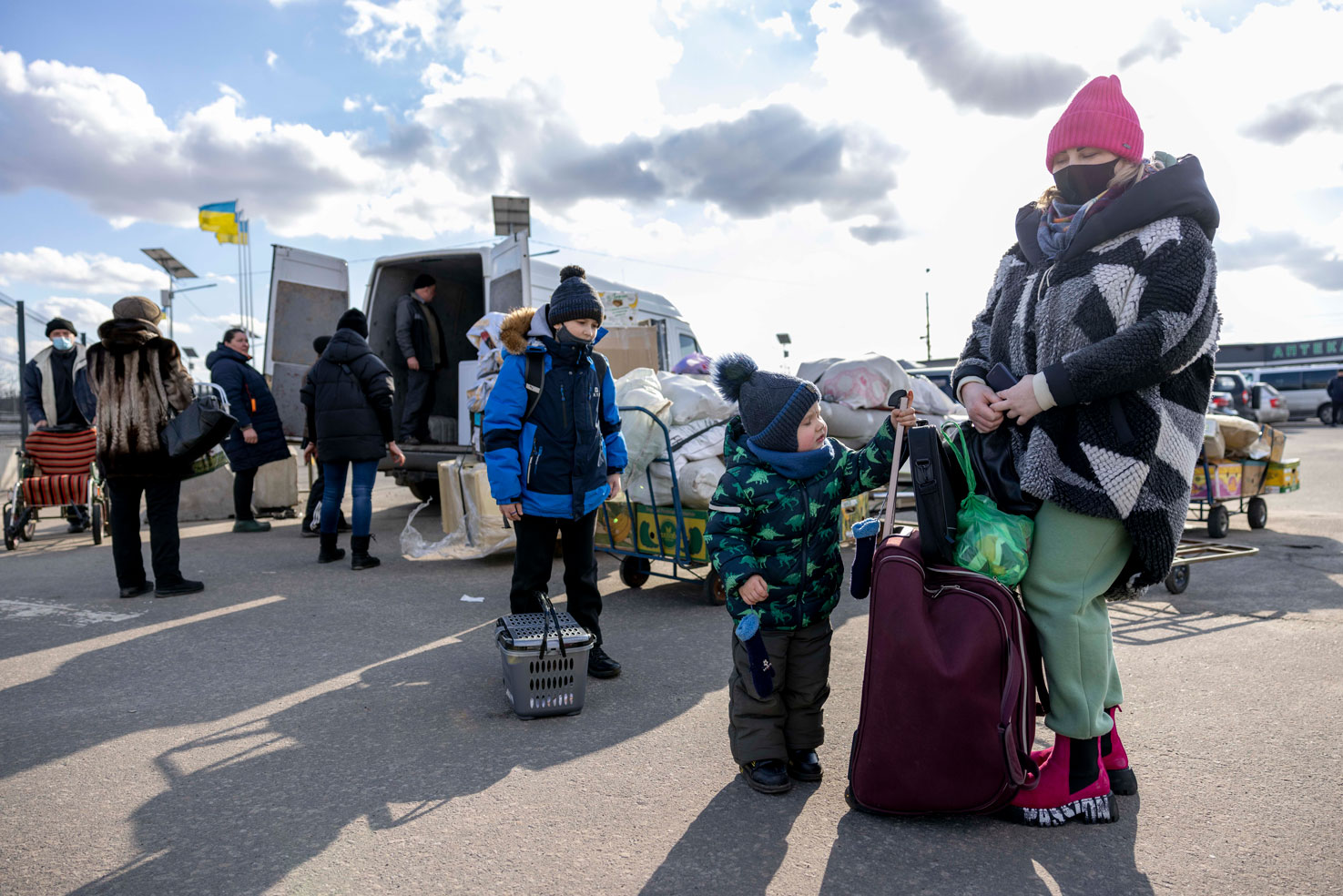Tanja Verbovskaya is just about to tell us about the horror of living close to the front line when we hear a whistling sound from the sky — and then a boom. “I’m scared,” she says “But where can I go? What can I do?” She looks up to the sky waiting for the next shell and then yet another boom.
Once upon a time, Stanytsia Luhanska, located 12 miles north of separatist-controlled Luhansk, was a neat little village that its inhabitants were proud of. Since the war started in 2014, many of the houses are abandoned, and those still living there are tormented by years of anxiety.
And no doubt that anxiety is bound to grow with the Russian President Vladimir Putin’s announcement today that he has recognized the Russian-occupied territories of Donetsk and Luhansk as independent states and ordered Russian forces to move in under the guise of “peacekeepers.”
Tanja is 51 years old, disabled and alone. She survives on her small pension and lives in a small outbuilding next to the ruins of what was once her parent’s home.
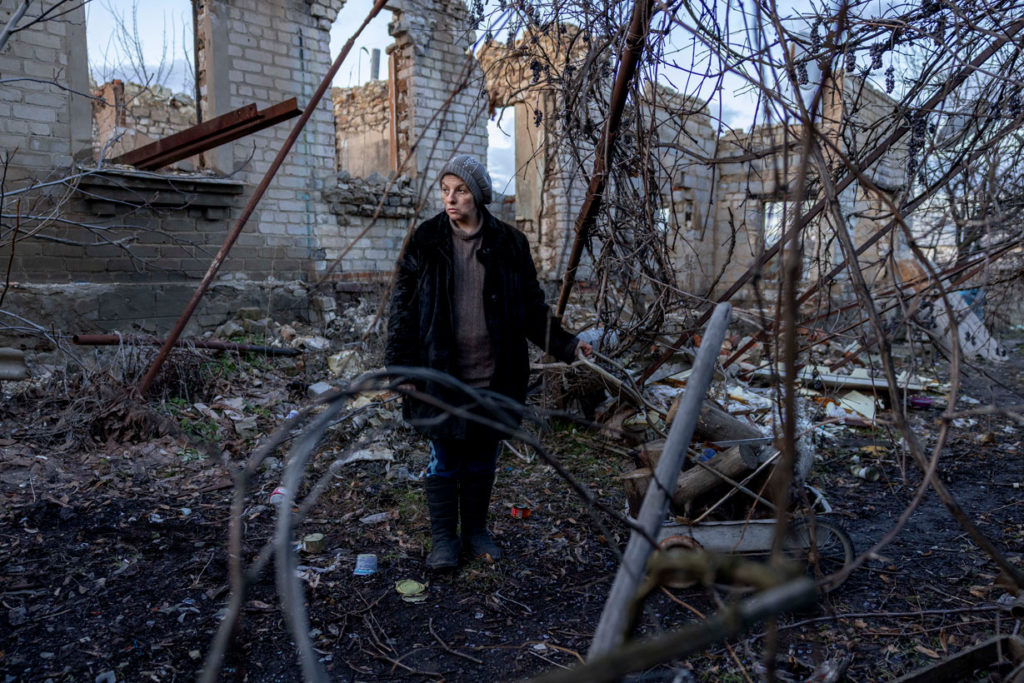
In the intense battles of 2015, it was struck by grenades and burned to the ground.
The only thing left standing is the brick walls of the ground floor.
The war has been ongoing, to varying degrees, for eight years. However, after a kindergarten was hit by two grenades on Feb. 17, the shooting has reached a new level of intensity.
“Before that it was quiet. But now the explosions have started again,” Tanja says.
On the street outside Tanja’s house we meet her neighbor Maria Nedinskova, 67, one of the other few who still live here. She, too, looks up at the sky in a resigned frustration.
“What a nightmare, when will all this end? … I cannot take it anymore,” she says. “During this war, I have had three heart attacks. This is what the war does.”
Now Maria is terrified that it will become a full-scale war again.
“We are very afraid of that. One can expect anything to happen,” she says, adding, “If it starts again … then all of us will certainly not survive.”
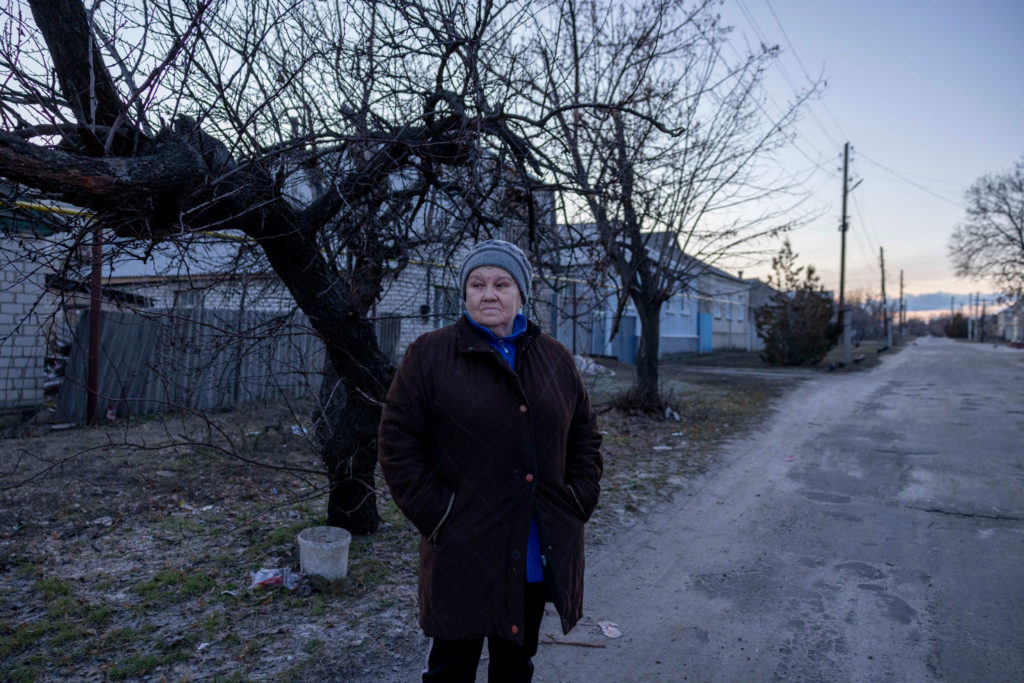
Tanja nods and mumbles back.
A couple more shells whistle through the sky. Without even a shrug, Maria comments on the shell’s trajectory: “Oh, now it flies … now it explodes … [two booms]. Oh, look there. And last night they fired grad rockets — 20 of them landed here in a row. That’s how it is.”
In another part of the village, we meet 37-year-old Sergei Tamarevski. He has come to look after his sister’s house. On the same day as the shelling of the kindergarten, her house was struck by a shell that went straight through the living room ceiling. It was 9 p.m. and his sister Ekaterina Tapolniki, 46, was sitting in her living room when an artillery piece hit the ground just outside the house.
The next second, a projectile struck through the roof.
“When they started firing, my sister was sitting here at the computer, and she was just running into this other room. And then the projectile came here,” Sergei explains.
He’s pointing to a big hole in the ceiling. The living room is a mess, windows are broken, the beams have given way and the roof is leaning alarmingly.
The sofa is full of lumber and glass.
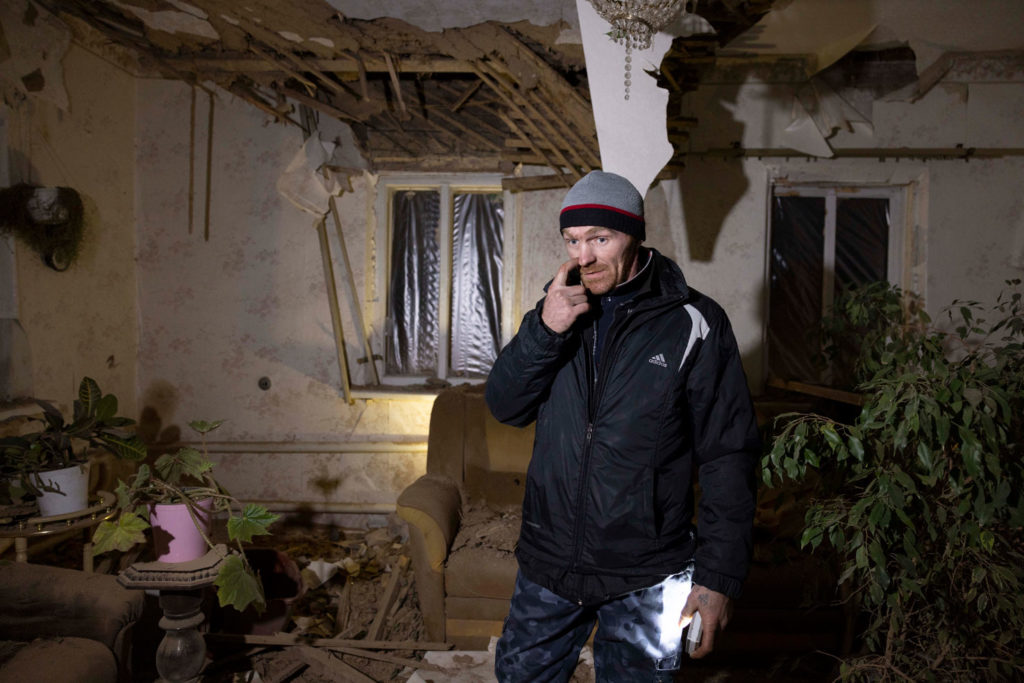
In the morning, an aid organization came with plastic so they could cover the hole. When Sergei was standing on the roof, more shells came flying in.
“I even saw from which direction they fired — they came from the other side. A bang and a flame of fire, and then I heard it fly and landed two streets away, 4 or 5 pieces,” he says.
As the shelling of Ukrainian-controlled territory has increased in the last few days, so too has the level of Russian propaganda aimed at Ukraine. With constant false accusations from Russia and a baseless claim of “genocide,” the leaders of the self-proclaimed, people’s republics of Luhansk and Donetsk have issued an order to mass evacuate women and children to Russia. Air raid sirens blared in the cities on Feb. 18, and “refugees” were transported in buses to the Rostov region of Russia.
Tanja’s brother lives in separatist-controlled Luhansk; she has been trying to contact him all day.
“The signal gets through, but he’s not answering. Maybe he has left for Russia?” she offers, with a questioning tone in her voice.
But men are not allowed to leave the occupied territories. In addition to the evacuation, men between the ages of 18 and 55 are banned from leaving the area, and a general mobilization has been announced in which “all men who can carry a weapon” are ordered to serve in the so-called People’s Republics armies.
On social media channels there are witness statements about how men are forced to join the military.
One of the few functioning border crossings from the occupied territories is in Stanytsia Luhanska, which is under Ukrainian control. When we visited on Sunday, mostly women and children came through the border.
Anna, 35, who has just come through the checkpoint with her two children David, 3, and Nikita, 10, describes the situation in Luhansk as calm, but many are afraid. “I have not heard how they shoot, but they write on the internet that they shoot a lot,” Anna says.
Anna and her children are going to move in with her grandmother, who lives further away from Ukraine’s eastern border with Russia.
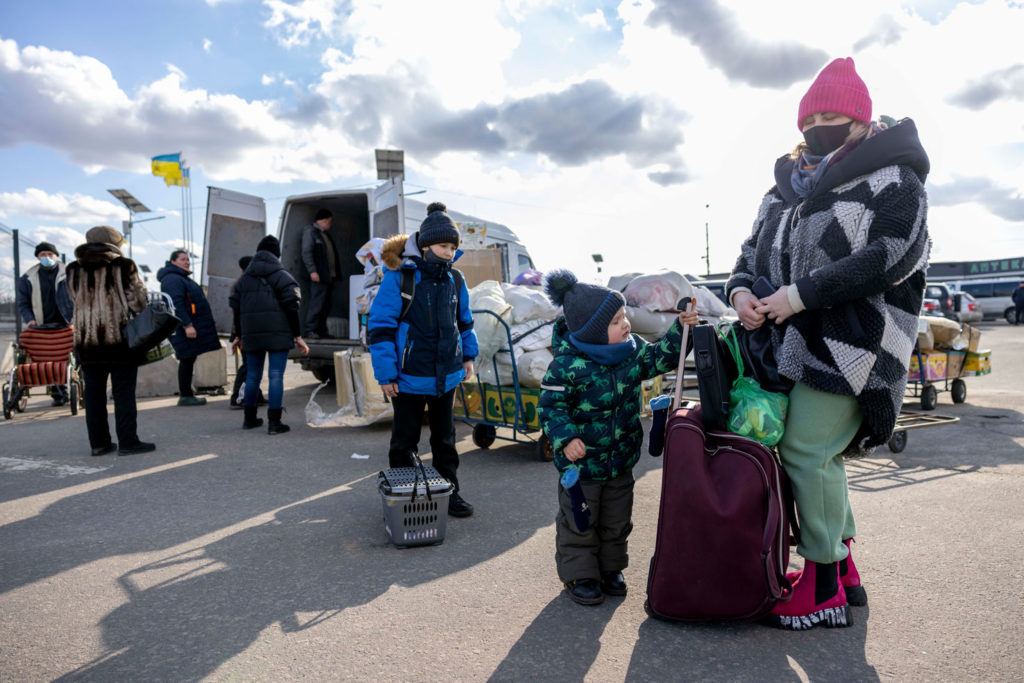
“We want peace now, all the rest no longer matters. We want peace and quiet and to be able to live without fear,” she says.
Another who chose to leave Luhansk on Sunday is 34-year-old Inna, who walked across the border with her 11-year-old son Vanja, and her 2 1/2-year-old daughter Polinka in the stroller. Her husband was forced to stay — but, she explains, he has a job that means he may not have to be called up. “If they do not take him, he can be at home and guard the house.”
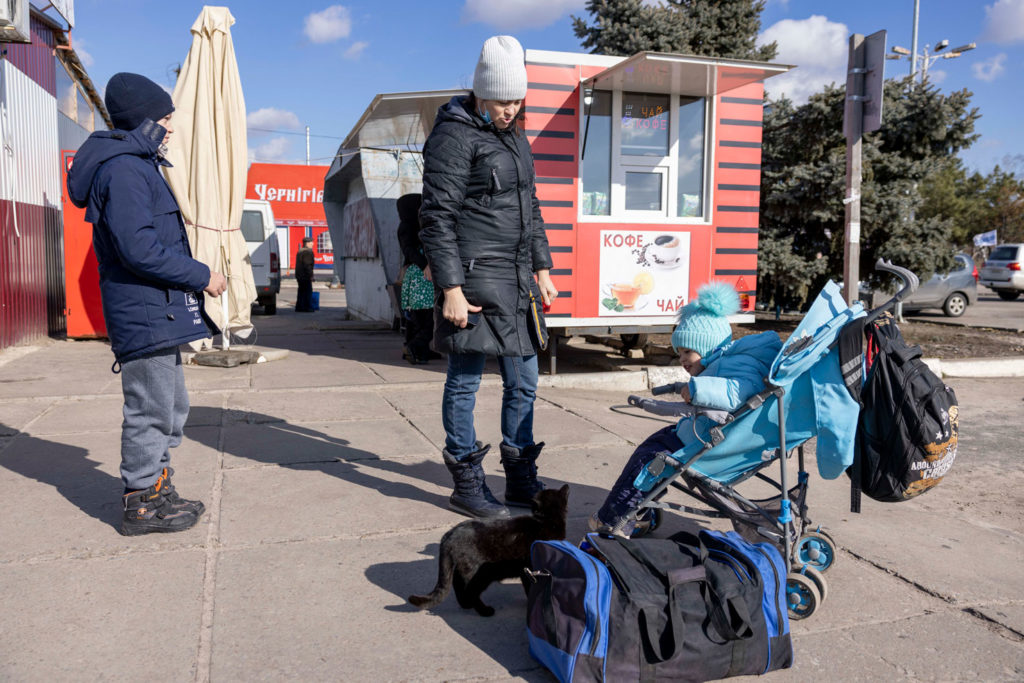
Inna confirms that the situation was calm when they left, but she heard banging on the outskirts of the city.
“We have no relatives in Russia, so we came here. If it is possible, it is best to go to my parents,” Inna says. “I hope that in a week it will end, and we will return home.”
Inna says she doesn’t even like to think about what could happen.
“I want there to be peace in the world and that I will be able to return home to my beloved. And that my parents can come and visit us, and we can visit them. That there were no boundaries so the children could meet their grandmother and grandfather.”
Her eldest son has already experienced the war, when it began in 2014. And now he understands very well what is going on.
“To the youngest I just say that we are going on an excursion.”
Sign up to our mailing list to receive our stories in your inbox.




